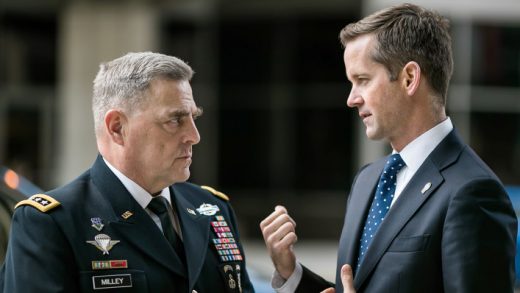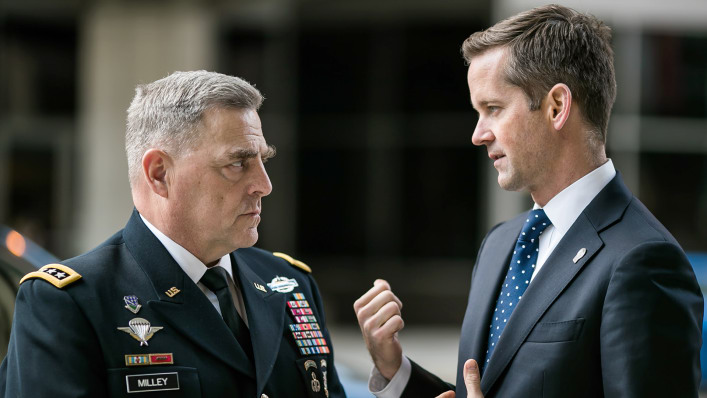How Veteran-Run Innovation Incubators Are Training Soldiers To Run Startups
By Rina Raphael , May 26, 2017
U.S. Army engineer officer Kimberly Jung found her business inspiration in a rather unlikely setting: the minefields of Afghanistan.

It was while clearing roadside bombs that Jung realized she wanted another way–beyond her service duties–to rebuild the war-torn region.
“It felt like every time we found [a bomb], a new one would take its place,” Jung recalls. “It was a never-ending cycle.”
Along the way, Jung and three other service members stumbled upon a robust farming community harvesting saffron, the world’s most expensive spice. The red-gold delicacy, taken from the tiny pistils of wild crocus flowers, has long been used to enhance cooking and for ancient medicinal purposes, the farmers were quick to explain.
But they also bemoaned how the war made getting what they grew to market difficult. And that is when Jung’s ‘it’ moment came together: Maybe she and her team could connect the farmers to the outside world. But how?

“[I realized] business is a sustainable way to lay a foundation for peace,” explains Jung.
When it was time to return home, she and her fellow soldiers packed bags of saffron in their luggage to sell in the United States. Within months, top restaurant chefs and gourmet food retailers demanded substantially more than their inventory.
With limited resources, Jung and her colleagues turned to Bunker Labs, a nonprofit organization and incubator helping veterans grow and polish business ideas. It was there that they officially founded Rumi Spice, which partners with Afghan farmers to sell sustainably farmed saffron to customers around the world. One ounce of the delicacy sells for $169.
“The international community, for over 16 years now, has put billions of dollars into Afghanistan,” explains Rumi Spice cofounder Keith Alaniz. “But no one was really making the connection with the Afghan private sector and trying to do things to help rural Afghans by improving private enterprise.”
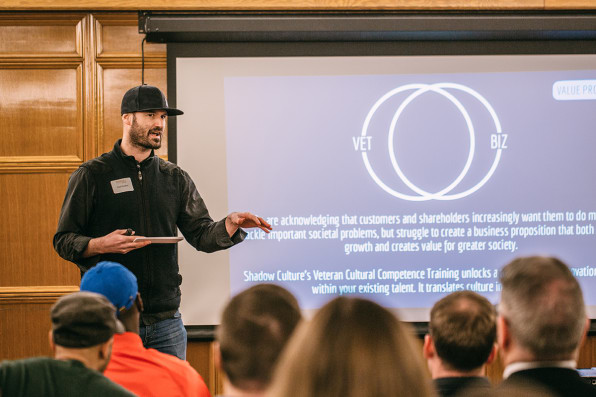
The alternative for some Afghani farmers is instead of expanding saffron and other crops, they turn to cultivating poppies for opium, which funds the Taliban. Roughly 80% of the Afghan population relies on the rural agriculture economy.
Bunker Labs guided the young startup in crafting a business plan and introducing them to professionals in packaging, importing, exporting, and e-commerce sales. They even hooked them up with an accountant.
It’s one of many incubators run by and servicing veterans, emulating Silicon Valley’s success in helping early-stage companies. The purpose is not to just give these men and women the tools to succeed in the marketplace, but also to build one of the largest business networks in the country: one that currently boasts 19 million veterans. Vet-Tech, for instance, is a San Francisco-based startup accelerator with over 100 veteran startups in its portfolio and 250 business partners providing $2 million in free services.
Business is a popular career choice for these service members: A Census Bureau survey found that veterans are 45% more likely to be self-employed than non-veterans. That self-starter mentality has proven successful: Nearly 1 in 10 small businesses are veteran-owned, according to the U.S. Small Business Administration. That’s approximately 2.4 million small businesses, generating over $1.1 billion of the nation’s total sales per year. These businesses employ 5 million people and generate an annual payroll of $195 billion.
The National Veteran-Owned Business Association, which connects corporate America to veteran-owned startups, found that the number of Fortune 500 companies that include veteran-owned firms as preferred vendors in their supply chains doubled over the last eight years.
“Veterans make some of the best entrepreneurs because they have very limited resources but they have a mission to accomplish,” says Jung. “They get it done, no matter what it takes.”
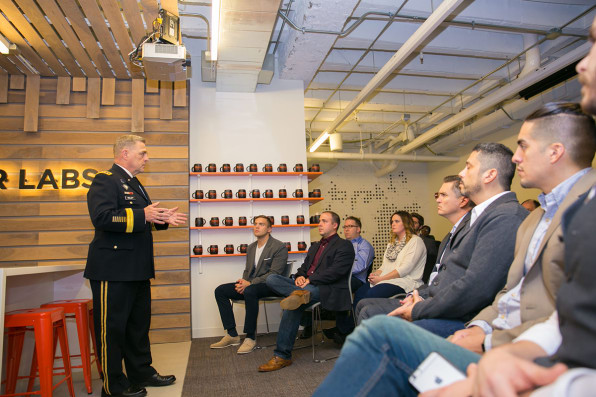
A Broader Network
Since 2014, Bunker Labs, headquartered in Chicago, has guided more than 370 companies. There are 15 Bunker Labs chapters in the U.S., including ones in Los Angeles, New York, San Francisco, Philadelphia, and Nashville. The free-of-charge services include coworking space, a 13-week accelerator program, mentor partnerships, pitch events, and access to local business leaders and Army alumni.
Bunker Labs CEO Todd Connor served in the Navy from 2000-2004 before venturing into consulting for over a decade. He ultimately decided to use his business expertise to empower fellow former men in uniform. Veterans compose 1% of the population, and while plenty of Americans and industries strive to support them, they often don’t know how to interact with them, says Connor. Organizations often talk to them as if they need help, leaning on the assumption that they’re “broken.”
“It’s easy to market to them the wrong way,” says Connor, stressing, “we keep it aspirational.”
Bunker Labs’ research found that 25% of veterans want to start businesses–and want to do it in their local communities. But they can’t do that within a vacuum. They need mentors and industry introductions. “The no. 1 challenge for veterans is access to network,” says Connor.
Veterans, Connor found, are eager to help other veterans. “It’s the most powerful alumni group in the country,” he says, noting the Army’s strong ties and established brand. “This is a preferred network that hasn’t been organized.”
Bunker Labs serves as an incubator and almost as a LinkedIn for veterans, though it does not invest or take company equity. Instead, the organization relies on sponsors to finance each outpost. It began with local banks, then expanded to corporate sponsors such as Comcast and JP Morgan. Currently, partial funds come from organizations such as The Bob Woodruff Foundation and the Small Business Administration.
“It’s a momentum that’s been building,” says Connor.
Twenty cities’ local governments already approached Bunker Labs about setting up shop in their areas, with Detroit, San Antonio, and Atlanta high on the waiting list. “Middle-market cities are strong for us,” explains Connor.
There are even opportunities for veterans who cannot access the physical outposts. Bunker Labs released an online platform called Bunker in a Box, a virtual mission-oriented challenge that essentially gamified the startup process. The game features ribbons and visual elements reminiscent of Army service to create an immersive (and familiar) learning experience. Over 1,500 used the platform, and Bunker Labs plans to further scale the offering.
It’s not just the budding entrepreneur seeking Bunker Labs. Established entrepreneurs running growth companies–those which passed a certain threshold of performance and revenue–need support scaling and hiring staff members. At all stages, these veterans depend on Bunker Labs’ network to get to the next level.
It’s about fully preparing them for the obstacles ahead because, as Connor states, “The market doesn’t care that you’re a veteran . . . the product needs to be good.”
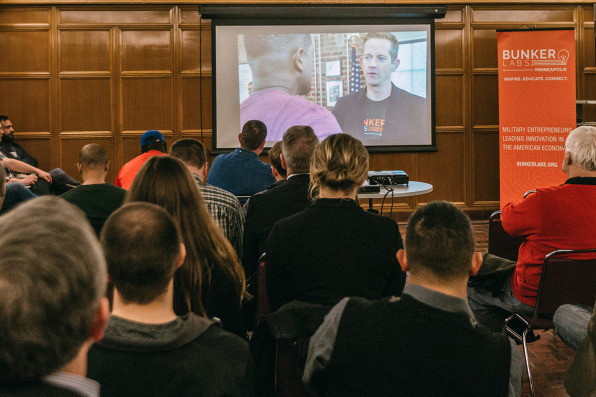
Built On The Battlefield
Former U.S. Air Force officer Phillip Potter saw his hometown of Phoenix as the ideal breeding ground for veteran-owned startups: Veterans compose 8% of the adult population but own 12% of privately held businesses and generate more than 15% of all sales receipts. Not to mention, roughly 33% of Arizona’s top 30 publicly traded companies were founded by a veteran or have a veteran in the C-suite.
“We punch above our weight class,” says Potter.
In 2016, Potter founded The Armory, a mentorship program that provides free work space, networking events, and investor introductions for veteran-owned startups. Like Connor, he wanted to shift the perspective of veterans to one that emphasized strength–how military life mimics startup struggles.
“[In the Army], we had to work in very small teams without tremendous guidance,” explains Potter, “so we’re familiar with uncertainty and risk management.”
Since its inception, The Armory fostered 22 veterans and plans on aiding 40 more through 2017. It has a current portfolio of 10 companies, ranging from a cybersecurity company to a startup that produces patented ergonomic trash cans.
Potter works with several veteran organizations to identify potential entrepreneurs, then takes a lean approach in guiding them through the startup process. The Armory offers a 2,400 square-foot coworking space, but for no longer than 10 months. Within that time, participants work through the idea phase, concept viability, product development cycle, and simply, “How money works,” says Potter, since that isn’t something they necessarily learned. Once a firm business plan is formed, The Armory introduces veterans to networking opportunities and provides them with legal counseling.
One alum of The Armory is Rush Club, a head-to-head weight class fitness competition. The company pits athletes from around of the world against each other in a live single-elimination competition for a chance at a title belt. It’s like wrestling, but for trainers and professional athletes, including those who have lost limbs in combat. “He rethought exercise and made it a spectator sport,” says Potter.
Rush Club approached The Armory a year ago with proof of concept. Founder A.J. Richards was concerned about to how to scale the concept since production cost was high–he spent $10,000 to produce and broadcast one show–and only saw 3,000 viewers.
Potter provided an essential pivot: “‘Why don’t you do it on Facebook Live?’” recounts Richards. “He brought some much-needed outside perspective.”
The very next event boasted 60,000 Facebook Live viewers. Today, over 200,00 watch the monthly competitions.
R.J. Jones, VP of investor relations for Zillow Group, approached The Armory specifically to help transfer veterans’ skills to the startup world. The former Army platoon leader taps into what veterans learned on both a personal and organizational level during their time in service. On the battlefield, they discovered their limits, abilities, and how to control their emotions under duress. They also learned how to navigate team structure, contribute to a company’s culture and values, as well as serve others. Even staying up all night to finish a project is something they perfected during deployment.
As Potter notes, one by one, each incubator and success story changes the narrative. It’s no longer a tale of “broken” or “needy” veterans, but one of what they’re able to accomplish “long after we’re done and we hang up our uniforms.”
The cities whose leaders asked if they could create outposts in their communities is a particular passion for Potter, who sees a need for such access in cities that possess a greater military-civilian divide. There, it’s common for veteran entrepreneurs to struggle to succeed. Sometimes they’ll be underemployed, other times they’ll struggle harder to get capital. It’s not that these areas don’t “support” veterans; it’s just a lack of familiarity and access.
There are also smaller-scale opportunities for budding veteran entrepreneurs across the country, ranging from one-day intensives to special seminars at established incubators. Techstars, for example, runs Patriot Boot Camp, a three-day technology entrepreneurship program held twice a year. Since 2012, the program delivered 10 programs in eight cities, training more than 600 entrepreneurs who have gone on to raise more than $50 million in venture capital and create 1,100 jobs, reports its CEO, Charlotte Creech.
The program has proven so successful that Patriot Boot Camp plans on aggressively expanding into concrete outposts in the coming year.
“We will soon be launching regional community hubs to provide continued education, mentorship, and support to our alumni,” said Creech via email, “and to build inclusive communities that will advance veterans as creators, innovators, and entrepreneurs building the new economy.”
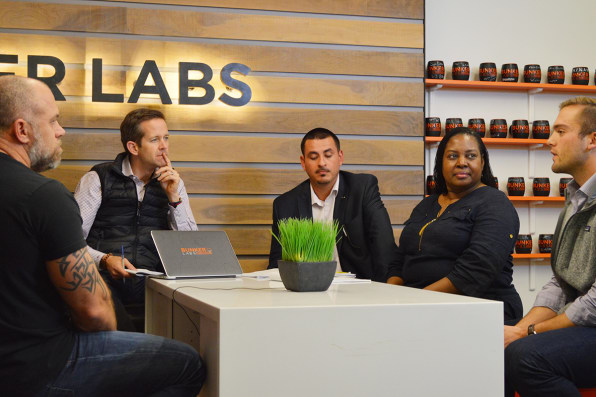
Federal Investment
The government also lends a hand. The U.S. Small Business Administration (SBA) offers 20 veteran business outreach centers that provide counseling, training, and access to capital and contracting opportunities. The SBA works with the Departments of Defense, Labor, and Veteran Affairs to offer guidance to service members while they are in service, as well as to transition soldiers to post-Army life.
“It starts the moment they enter active duty,” explains Barb Carson, associate administrator for the Office of Veterans Business Development., U.S. Small Business Administration.
In the “Introduction to Entrepreneurship” course, participants learn business fundamentals, including an overview of the entrepreneurial process, identifying market opportunity, determining costs, and understanding the legal considerations of business ownership. Roughly 10% of Army members have taken advantage of this offering since 2013. Over 55,000 service members have been counseled on their business concepts, and 40% of those have pursued their plans. Of those, 90% remain in business.
The more intensive Boots to Business program was established in 2014 to assist the 250,000 service members from all branches of the military that transition each year. It works with all age groups to develop and fine-tune business ideas and assist in areas like legal affairs, marketing, and IP protection. It too offers access to capital and reduction in fees in loans backed from SBA. Most important, however, is the last step, which is getting these startups ready to compete for federal contracts: 3% of federal contract dollars is mandated to be awarded to veteran-owned businesses.
“We have surpassed that goal since 2012, every year,” says Carson, who witnesses a “maturing” veteran business market. Each year, there’s an uptick in private sectors seeking to work with veterans.
“We think we are on our way to having the next great generation of veteran entrepreneurs,” says Carson, referencing the World War II generation. Almost 50% of WWII vets started a business upon returning to their hometowns. “That’s what we want to enable this generation to do.”
A GI bill that provided small business loans was partially responsible for the post-WWII surge. Post 9/11, however, service personnel received home loans and education benefits, but no longer the business loan option. Some critics said that it was too risky compared to education, while others, such as Bunker Labs’ Connor, think it a vital aspect of establishing post-Army career opportunities.
“It’s a lively discussion,” says Carson, admitting that should there be proposed legislation to reinstate it. “We would like a chance to test it.”
Till then, incubators fill that gap.
Winning The Market
Today, just three years later, Rumi Spice employs 90 Afghani farmers and 380 Afghani women, making it the largest private employment sector of women in the country. The spice startup, which grew four times in revenue since 2014, is now the largest foreign direct investment in Afghan agriculture. It boasts six channels–with retail, bulk, and food delivery (Blue Apron is one of their biggest partners) among them.
Their product can be found in award-winning restaurants like Thomas Keller’s French Laundry or Daniel Boulud’s award-winning French flagship, Daniel. Next steps include extending into more product sectors like beverages and syrups.
While Jung credits the work ethic instilled during her Army days, she recognizes Bunker Labs’ role in Rumi Spice’s rapid growth. “We wouldn’t have moved as quickly [without Bunker Labs],” says Jung. “They were instrumental.”
Rumi Spice now works with the Afghan Embassy and is at a point where it can advise current companies that find themselves at Bunker Labs. Jung is now a board member, serving as an example of how veterans helping veterans leads to shared success.
“Just like in the Army, you can’t do anything without your team,” Jung says of the network that got Rumi Spice to where it is now.
Likewise, Rush Club benefitted not only from Potter’s guidance, but from the The Armory’s community. Through the program, Richards found support from marketing firms, live event specialists, and even the mayor of Phoenix. He mentions how, in passing at the coworking space, one former green beret explained how to best capture viewers’ contact info.
“Learning from other [Armory participants] has been a pleasant surprise—we help each other’s businesses,” says Richards. “It’s great to be around other veterans who are working hard to create something. It is becoming another form of brotherhood.”
Bunker Labs and other incubators are helping young veterans start new businesses—including one woman who found her inspiration in Afghanistan’s minefields.
U.S. Army engineer officer Kimberly Jung found her business inspiration in a rather unlikely setting: the minefields of Afghanistan.
Fast Company , Read Full Story
(100)

